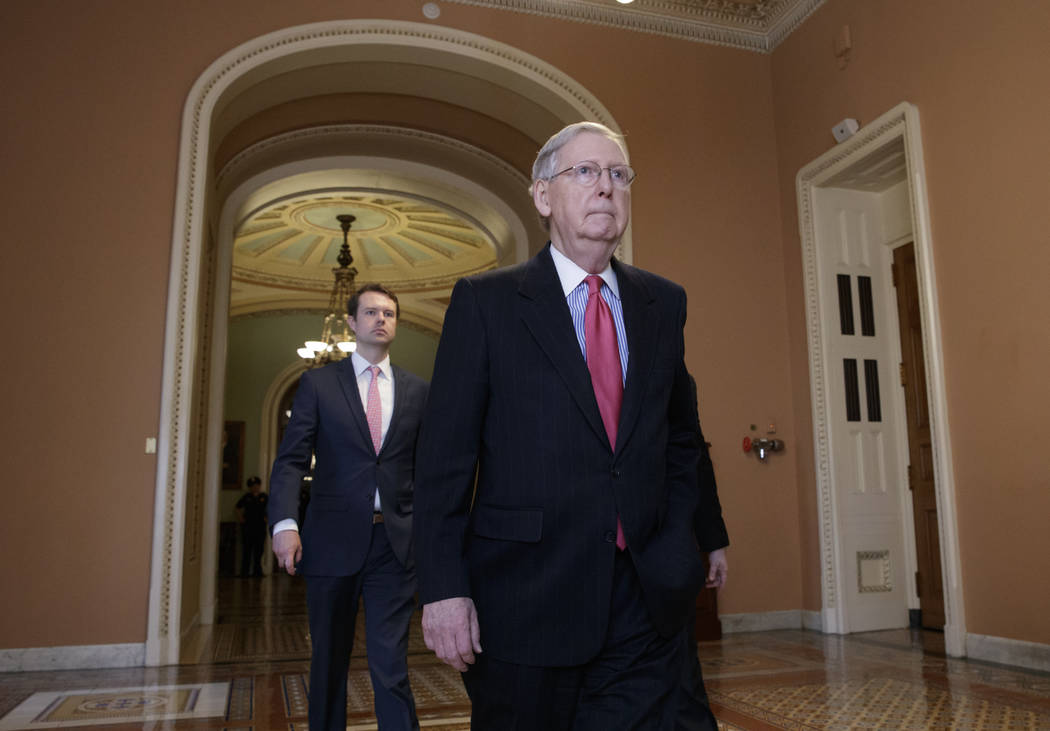Republican senators trigger ‘nuclear option’ to clear way for Gorsuch vote
WASHINGTON — Senate Republicans invoked the “nuclear option” and lowered the bar for confirming future U.S. Supreme Court nominees after a historic filibuster of Judge Neil Gorsuch by Democrats on Thursday.
Senate Majority Leader Mitch McConnell, R-Ky., moved to change the Senate rules that required a 60-vote majority after Republicans were unable to defeat opposition to the Gorsuch nomination.
“Our Democrat colleagues have done something today that is unprecedented in the history of the Senate,” McConnell said.
“Unfortunately, it has brought us to this point. We need to restore the norms and traditions of the Senate and get past this unprecedented partisan filibuster,” he said.
The Senate voted along strict party lines, 52-48, to change the rule.
Senate Minority Leader Charles Schumer, D-N.Y., said the rule change would heighten partisan rancor and lead to more ideological judges appointed to the court. “The guardrails are being dismantled.”
“The answer is not to change the rule, it’s to change the nominee,” Schumer said.
Democrats were successful earlier in a filibuster. Republicans could not overcome Democratic opposition to get the 60 votes needed to end debate and move to an up-or-down vote on the nomination. The Senate voted 55-45.
After a series of votes to postpone proceedings, McConnell moved to change the rule. Gorsuch, 49, is expected to be confirmed Friday on a simple majority vote.
“He’s well qualified and will make a stellar addition to the Supreme Court,” McConnell said.
McConnell said the Democratic filibuster was a misguided move prompted by left-leaning special interests and had more to do with partisan opposition to the president.
“This isn’t about the nominee,” McConnell said. “It’s more about the man who nominated him.”
Gorsuch serves on the Denver-based 10th Circuit Court of Appeals in 2006. He was nominated earlier this year by President Donald Trump.
Trump, traveling to Florida, told reporters on Air Force One that “we have a great person right now in Judge Gorsuch.”
He said he might get the opportunity to nominate a second jurist to the high court, and “there could be as many as four.”
Gorsuch would replace Supreme Court Justice Antonin Scalia, who died Feb. 13, 2016 in Texas.
Democrats have accused Republicans of stealing the seat, failing to grant a hearing to Judge Merrick Garland, appointed last year by President Barack Obama to fill the vacancy.
Sen. Dick Durbin, D-Ill., charged McConnell and Republicans of using gamesmanship to unfairly keep Garland off the bench during the 2016 presidential election year that ended with a nation deeply divided.
“The reason we are here is because they kept that position open so it could be filled by a Republican,” Durbin said.
The Senate voted mostly along party lines on the filibuster. Three Democrats from states that Trump won in 2016, and who are up for re-election, voted with Republicans: Sens. Joe Manchin, D-W.V., Heidi Heitkamp, D-N.D., and Joe Donnelly, D-Ind.
Sen. Michael Bennet, D-Colo., also voted with Republicans to break the filibuster.
Nevada’s two U.S. Sens. Dean Heller, a Republican, and Catherine Cortez Masto, a Democrat, voted with their respective party leaders on each vote cast Thursday.
Heller said he will vote to confirm the nominee.
“Judge Gorsuch is not only an exceptionally qualified candidate given his education and experience, but he is also a fellow Westerner who understands our values and unique issues — ranging from water to energy — that are important to us,” Heller said.
Gorsuch’s previous rulings and work were cited by Cortez Masto as a reason to vote “no.”
Cortez Masto said Gorsuch would “act as a rubberstamp to President Trump’s extreme agenda.”
“I am not confident that Judge Gorsuch understands how his decisions will impact workers, immigrants, women’s health and economic security, disabled Americans and the everyday Nevadans that I am here fighting for,” she said.
Senate Democrats were angered by the Republican vote to change Senate rules on Supreme Court nominations.
“I am sick with regret,” said Sen. Chis Coons, D-Del.
But McConnell and Majority Whip John Cornyn, R-Texas, said Democrats forced their hand.
The nuclear option was used by Democrats in 2013 to break Republican opposition to Obama’s judicial nominees for lower courts. Then-Senate Majority Leader Harry Reid, D-Nev., invoked a rule change to break a logjam over appointed federal judges who could not be confirmed.
McConnell, like Reid in 2013, declared Thursday that he was forced to change the rules “for the sake of our country.”
Contact Gary Martin at gmartin@reviewjournal.com or 202-662-7390. Follow @garymartindc on Twitter.




















